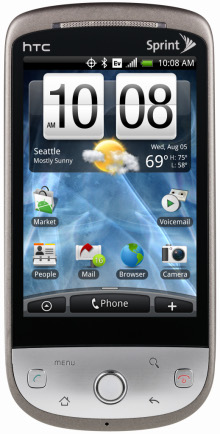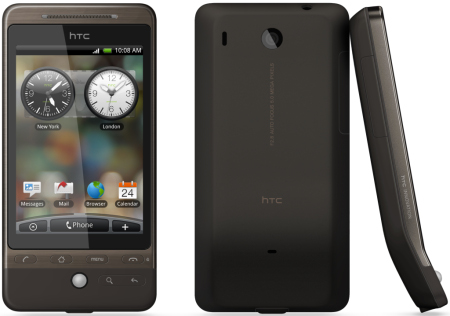Carrier takes heroic step toward Android
Sep 4, 2009 — by Eric Brown — from the LinuxDevices Archive — viewsSprint will be the first U.S. carrier to offer HTC's “Hero” Android smartphone, complete with the “Sense” UI and a low $180 pricetag. Meanwhile, Google is responding to criticism from Android developers by adding promotional mechanisms to Android Market, and eWEEK looks inside the Android-based T-Mobile MyTouch 3G.
Sprint, which took a pass on Android due to its belief that the Google-backed open source phone stack was not yet sufficiently baked, is now apparently satisfied with the upcoming "Donut" (Android 1.6) release, and will sell the Hero in the U.S. starting Oct. 11. The phone will sell at Sprint stores and Best Buy for a low $180, with a two-year contract and $150 in rebates. Sprint already offers the BlackBerry Tour 9630 smartphone, as well as the Linux-based Palm Pre, the latter in an exclusive deal that will last the remainder of the year.
Announced in June, the Hero is being offered by Orange this summer in the U.K., followed by European and Asian launches. The Hero is based on an ARM-based Qualcomm MSM7200A processor clocked to 528MHz, with 288MB of RAM, 512MB of internal flash, says Sprint. It offers a Micro SD slot with a 2GB card standard and support for up to 32GB, says the carrier. The Hero is said to support networks including HSPA, WCDMA 900/2100MHz, and Quad-band GSM/GPRS/EDGE 850/900/1800/1900MHz.


Sprint Hero
(Click on either to enlarge)
Otherwise, the Sprint Hero appears to be physically identical to the original. It offers a standard, 3.2-inch, 320 x 480 capacitive touchscreen with an onscreen QWERTY keyboard instead of a tactile version. Other features are said to include a 5-megapixel camera with auto-focus, 802.11/b/g WiFi, Bluetooth 2.0, GPS, digital compass, and a 3.5-mm stereo handset jack.
The Hero stands out less from the hardware than from its HTC Sense UI, which has earned some early praise. Layered atop the Linux-based Android operating system, the HTC Sense UI layer offers a seven-panel wide home screen studded with customizable widgets. In addition, users can set up highly customized profiles and other user-specific functions, says Sprint.
HTC Sense is also said to offer unified messaging features for managing and integrating phone calls, emails, text messages, photos and other data. A new "HTC Footprints" feature enables users to capture "digital postcards" that combine photos, notes, audio clips, and GPS coordinates.
Visual voicemail is said to be provided, and messaging support includes POP, IMAP, and Exchange Active Sync. The phone offers Adobe Flash support, as well as Sprint TV with live and on-demand programming, NFL Mobile Live, and NASCAR Sprint Cup Mobile, says Sprint.
The Hero provides synchronization for built-in Google mobile services, including Google Search, Google Maps, Gmail, and YouTube. It is also said to offer full access to some 8,000 applications built on Android. (For more details on the HTC Hero and HTC Sense, please see our original coverage, here.)

The original Hero, carried by Orange in the UK
(Click to enlarge)
Getting in touch with MyTouch 3G
Sprint's version of the Hero will be the third Android model to be launched in the U.S., following the similarly HTC-manufactured G1 and new MyTouch 3G, both offered by T-Mobile. The MyTouch 3G, which shipped about a month ago, also adds some UI goodies and "branded experience" atop Android, but the Sense UI offers a more substantial change in the UI, according to early reviews. Now, our sister publication, eWEEK has run the MyTouch 3G through its paces in an annotated slideshow (see link below).
Soon, HTC will be joined by other vendors in the U.S. market for Android. (Samsung already offers its i7500 model in Europe). On Sept. 10, Motorola is expected to announce its first two Android phones, at least one of which is expected to be carried in the U.S. Earlier this summer, Sprint CEO Dan Hesse hinted that his company would field one of the early Motorola Android models, but now it appears Sprint will at least initially go with the Hero instead. T-Mobile and Verizon Wireless are expected to be the carriers Motorola announces next week for its "Morrison" and "Sholes" phones, respectively.
Google helps Android developers sell their wares
This week, Google announced it would upgrade its Android Market app-store with new features that help Android developers market their apps, according to a story in eWEEK's Google-Watch. Google has "taken a beating" from developers complaining that they aren't making enough money from Android Market, writes Clint Boulton.
To answer these complaints, Android Market will let developers promote applications with screenshots, promotional icons, and descriptions, says the story. The new program will launch this fall with the release of Android 1.6 (Donut). Google has also created sports, health, themes, and comics sub-categories for applications, and added seller support for developers in Italy, writes Boulton.
Availability
The Sprint Hero, manufactured by HTC, will be offered for Sprint network customers in the U.S. for $180 after rebates, with a two-year contract, says Sprint. Pre-registration may be found here.
eWEEK's slide show for the HTC-manufactured T-Mobile MyTouch 3G, may be found here. The Google Watch story on Android Market upgrades may be found here.
This article was originally published on LinuxDevices.com and has been donated to the open source community by QuinStreet Inc. Please visit LinuxToday.com for up-to-date news and articles about Linux and open source.